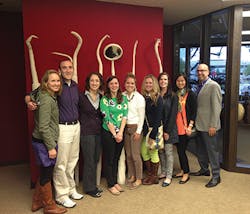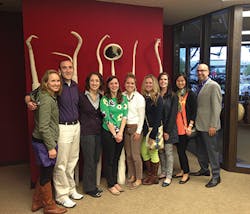The case for residency-based practice management training
By Colleen Greene, DMD, MPH
A residency program field trip to visit Hu-Friedy and the ADA building in Chicago.
Shane Fisher, DDS (shown far right), implemented the residency practice management curriculum. The author is pictured third from the left.
Residency is hard. The hours are long, the cases are tough, and loan repayment rapidly approaches. I'm currently a second-year resident in pediatric dentistry at Children's Hospital of Wisconsin. The average week is a blur of operative treatment, inpatient consultations, outpatient sedations, and good old-fashioned paperwork. Days on call mean midnight trips to the hospital for trauma care.
Counterintuitively, the best window to teach a foundation in practice management knowledge may be during these grueling residency years. Despite challenging conditions, more and more dental students are pursuing postdoctoral training, whether in general dentistry or a specialty. The American Dental Education Association (ADEA) reports that 50% of all dental school graduates move on to a postdoctoral education program instead of heading directly into practice.1 Since debt keeps climbing, whether through compounding interest or new tuition costs, the success of one's future practice is even more important to accelerate as soon as possible. Though I'm paid a salary, the monthly interest accruing on my student loans is about the same as my rent.
Residents are much closer in time to the responsibility of running a practice and may be the ripest audience for high-yield business education compared to dental students. The stress of getting through dental school is so raw that it's difficult to appreciate the finer points of the business aspects of dentistry while also meeting clinic requirements and laboring over lab work ... at midnight ... alone.
Dental residency cohorts are very small compared to dental school class sizes, ranging from two to a couple dozen individuals. This is the perfect context for seminar style discussions on best practices and creative brainstorming sessions. Guest experts in any content area will be less intimidated and much easier to directly engage via the small size of residency classes. This is a clear educational advantage for learning the hands-on nature of practice management.
The best approach directly engages a variety of actual members of a dental practice's extended team. My residency program puts us face-to-face with a lawyer, an accountant, a benefits provider, an insurance representative, a dental supplier, a past state dental board chair, and more. We host seminar sessions with each professional individually across a full year with hour-long conversations about the state of practice today in our community and beyond. Each guest speaker is identified via the personal networks of our faculty with private practice experience. Their commitment to ethical practice and financial success is high and sets a standard for us to seek in future partnerships.
Field trips never go out of style and should be incorporated throughout a residency program. They enhance awareness of different practice styles as well as appreciation of local organizations and businesses that support dental practices. I am fortunate to be training in the bustling metropolis of Milwaukee, which is an easy drive to Chicago. Our program enjoys a full-day excursion to the Windy City to tour a dental equipment manufacturer as well as the headquarters of both the ADA and the American Academy of Pediatric Dentistry. Staffers and leaders were gracious hosts as we learned about current initiatives and products most applicable to our demographic and specialty.
Visiting area dental practices should be a mainstay of practice management education in residency. Having a unified clinical interest area and, again, smaller group sizes, this type of field experience is golden for residents. Many alumni of my program practice locally in a wide variety of offices. Coming into their environment after hours allowed for honest dialogue about the ups and downs of practice ownership, associateships, and employees.
Their office staff members shared insights into the souls of their practices and what keeps them motivated and engaged as employees. The designs of their offices ranged from entire suburban buildings to compact urban suites. As pediatric dentists, some chose a bright, younger, child-oriented design, while others took a more sophisticated theme. Meeting these doctors one-on-one builds appreciation for how personality and overall practice philosophy contribute to the design and function of each office.
While teaching dental residents, consider the best possible timing for when and how certain practice management content should be presented. For example, those in the first half of training may benefit more from basic networking skills and onsite practice visits. Those in the latter half of training will be more concerned with the details of contracts, negotiations, and specific associateship opportunities. Other topics, such as professional social media use and strategic continuing education choices, may be relevant at any time.
As a specialty resident, I know that it will be necessary to network effectively with area general dentists and other specialists as I develop my patient base. We've learned from experienced practitioners that it's necessary to graciously connect with community dentists and proactively learn about their referral needs and patterns. Local study clubs, medical offices, schools, or other institutions may be critical targets for early networking efforts as we develop our pediatric practices.
If you're in residency right now, or hope to be, and don't get this type of practice management education, it's never too late to self-organize some of these experiences for the benefit of your entire program! Arranging speakers and site visits would itself be an excellent networking exercise and a kind service for your colleagues. It may not take more than a phone call or an email to develop relationships with area experts.
We know that the only surefire method for learning how to manage a practice is by managing a practice. Yet, there are many fundamentals that can be learned through carefully designed curriculum during our advanced training years. If you are eager to get connected to a residency program and enhance its practice management curriculum, you can find the one nearest you by searching ADEA's Postdoctoral Application Support Service (PASS) for more than 600 programs nationwide (http://www.adea.org/PASSapp/).
If you're not physically near a program, you can always connect with residents at a professional meeting by looking for events specifically geared toward new dentists. Connect with the sponsoring organization's staff for their recommendation on the best way to cross paths with us. Sharing your wisdom with postdoctoral trainees will be a rewarding way to prepare the next generation at an ideal time in our professional development.
Acknowledgement: Many thanks to Shane Fisher, DDS, for implementing our residency practice management curriculum. Best of luck to him as he opens his own private practice this fall.
References:
1.http://www.adea.org/publications/library/ADEAsurveysreports/Pages/ADEASurveyofDentalSchoolSeniors2011GraduatingClass.aspx Table 44. Accessed July 21, 2014.
Colleen Greene, DMD, MPH, is a pediatric dentistry resident at Children's Hospital of Wisconsin and a recent graduate of the Harvard School of Dental Medicine. She is past national president and editor-in-chief of the American Student Dental Association, and has served on the editorial board of the Journal of the American Dental Association. You may contact her by email at [email protected]

